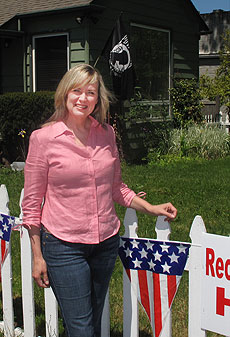lawsuit
A century-old Nebraska rule for initiative qualification has been struck down as unconstitutional by US District Court Judge Joseph F. Bataillon. The provision required signatures from “5% of registered voters of each of the 2/5ths of the counties in the state.” This meant that petitions for ballot measures were required to be circulated in at least 38 of the 93 counties in the Cornhusker State.
The plaintiff in the case, Kent Bernbeck, brought the suit claiming that under the now defunct rule, rural voters counted for more than voters in more urban areas.
“The court finds that the facts presented in this case show clearly that urban votes are diluted under the Nebraska Constitution,” the judge stated in his opinion.
In an expected move, one of the groups supporting an arena ballot measure says it’s planning to sue the city of Sacramento after the city clerk rejected a ballot measure for inconsistencies, according to KCRA-TV Channel 3.
The organizers of Sacramento Taxpayers Opposed to Pork are waiting to look at material from the city clerk before launching a legal challenge, according to KCRA.
On Friday, the clerk rejected the ballot measure for things such as inconsistent dates, missing language in some versions of petitions, some lacking required wording and not including the names and signatures of proponents.
Read More: here
Yesterday, the ACLU of Arkansas and the Arkansas Public Law Center filed a lawsuit on behalf of two citizens of the Natural State seeking to overturn Act 1413, a statute that establishes cumbersome restrictions on paid signature gatherers and provides new byzantine rules designed to disqualify whole petition pages of valid signatures due to the smallest of mistakes.
Toledo Blade columnist Marilou Johanek writes in praise of a lawsuit, Citizens in Charge v. Husted, filed in federal court by Ohio’s 1851 Center for Constitutional Law and seeking to overturn Senate Bill 47, which restricts non-residents from helping to gather signatures and reduces the time sponsors have to petition. SB 47 passed on entirely partisan votes in the legislature and was signed into law by Republican Gov. John Kasich earlier this year.
Johanek quotes Maurice Thompson, the 1851 Center’s executive director: “We like the checks on government that the initiative and referendum provides, and the opportunities for citizens to take lawmaking power into their own hands and deal directly with the issues.”
A lawsuit challenging the petition-gathering process that got a $950 million school-tax proposal on the November ballot was filed late Wednesday, according to a group opposing the measure.
The group, Coloradans for Real Education Reform, said Bob Hagedorn, a former Democratic state senator from Aurora, and Norma Anderson, a former Republican lawmaker from Lakewood, filed the suit in Denver District Court claiming that 39,555 of the signatures gathered for the ballot measure are invalid.
Read more:here
Efforts to halt a proposed light rail system via the initiative in Vancouver, Washington, have been thwarted by the city, and now the city’s actions have been upheld in court. Superior Court Judge John Nichols’ ruled the City of Vancouver could lawfully block the initiative from the ballot because the proposed measure’s attempt to restrict the city from following the mandates of a state light rail project went “beyond the initiative power.”
“Stated another way,” Judge Nichols wrote in his opinion, “the people cannot deprive the city legislative authority of the power to do what the constitution and/or a state statute specifically permit it to do.”
Nebraska petition laws are again being challenged in federal court by Citizen Kent Bernbeck, who claims the current system is unconstitutional. The two legal provisions being contested are: (1) the state’s county-based distribution requirement, which is in the state constitution, and (2) a state statute that forbids compensating paid circulators on a per-signature basis.
“He is bringing this challenge to guarantee all Nebraskans can participate in this core democratic process,” David Domina, Bernbeck’s attorney, told reporters. “A process so important that the founders of our nation called out the right as fundamental and to be preserved without intrusion.”
A veteran of multiple petition drives and lawsuits is taking on the state’s petition law once again.
Kent Bernbeck of Omaha filed a federal lawsuit Tuesday challenging two petition requirements as violations of his constitutional rights.
The first is a provision in the Nebraska Constitution requiring a geographic distribution of petition signers.
To make the ballot, an initiative petition must have signatures from at least 5 percent of voters in at least two-fifths, or 38, of Nebraska’s 93 counties.
Read More: here
The conservative group Judicial Watch has asked the Court of Special Appeals to overturn last November’s referendum on a new congressional redistricting map for Maryland, contending the wording of the ballot question was misleading.
Backed by Del. Neil Parrott’s MDPetitions.com, Judicial Watch filed an appeal of a Circuit Court decision last year upholding the wording. The plaintiffs asked the appeals court to require a new election using different ballot language.
The General Assembly approved the new map drawn up by Gov. Martin O’Malley and Democratic legislative leaders in a special session in 2011.
 Robin Farris had never been involved in politics before, but that changed when the retired Naval Officer saw news reports of wrongdoing and impropriety from the office of Pierce County Assessor-Treasurer Dale Washam. Dismayed and disgusted, Farris decided to start an effort to recall Washam, only to find that Washam’s fellow politicos in the state legislature had already been at work making sure that citizens had a hard time using the recall process.
Robin Farris had never been involved in politics before, but that changed when the retired Naval Officer saw news reports of wrongdoing and impropriety from the office of Pierce County Assessor-Treasurer Dale Washam. Dismayed and disgusted, Farris decided to start an effort to recall Washam, only to find that Washam’s fellow politicos in the state legislature had already been at work making sure that citizens had a hard time using the recall process.
The cause of citizen control of government won a big victory last Friday in little Boulder City, Nevada, as a judge ruled in favor of citizens and against the heavy-handed legal tactics the city government used in filing numerous lawsuits designed to threaten and intimidate citizens petitioning their government. 
The Portland Press Herald has this brief news story today about the legal challenge to  Maine’s Secretary of State over certifying petition signatures.
Maine’s Secretary of State over certifying petition signatures.